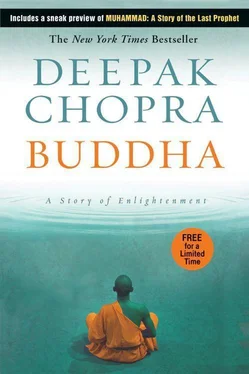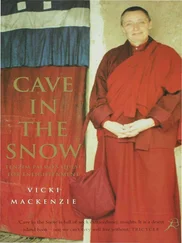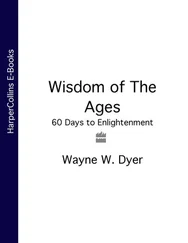“If you aren’t Gautama, who are you?” Assaji asked.
“I keep Gautama’s body, and you can call me by his name if you like,” said Buddha, smiling. “You need some way to find me in the dark. But I am not this body or this name. I am not a person any longer as you know it.”
“That tells me what you are not, but I still don’t know what you are,” said Assaji, pressing the point.
Instead of replying, Buddha closed his eyes and went into samadhi, something they had seen Gautama do a thousand times. Assaji was about to signal that they should follow suit when Gautama unexpectedly opened his eyes again. The monks were used to him being lost in silence for days.
“Do you want to meditate alone?” Assaji asked. “We can leave you.”
“It’s not that, dear friend,” said Buddha. “I have talked with only a few people since I came to be awakened. One blessed me with knowledge of good and evil. But no one has asked me who I am until now. You have given me another blessing.”
Assaji looked confused. “How is that?” he asked.
“When I closed my eyes, I saw my past lifetimes. Ten thousand of them, and I lived each one moment by moment.”
The five monks were amazed. “In the blink of an eye?” Kondana exclaimed.
Buddha smiled. “Two blinks, if you like. We have all been told since childhood that the cycle of birth and rebirth has brought us back many times. But as I went back to those lifetimes, I found that all of them were equal. I am every life I’ve ever lived, and yet I am none of them, for I can be here or there whenever I want.”
“Is this the knowledge that set you free?” said Assaji.
“Do you ask me that because you really want to know or because you feel worried and insecure?” asked Buddha.
Assaji looked uncomfortable. “Your feat seems superhuman,” he said. “If it takes something like that to reach enlightenment, what hope do we have? We’re just ordinary monks.” The others murmured in agreement.
“I didn’t return to discourage you or to awe you. You asked me who I am, and now I can tell you. I can also tell you who you are. You are not the separate self. You have a name that you answer to, but you have also answered to ten thousand other names. Which one is the real you? None of them. You identify with a set of memories. You know who your father and mother are. You set your sights on a goal that you cherish.
“But you have done exactly the same thing ten thousand times before. Therefore your memories, your parents, and your cherished goals are transient. They change as swiftly as mayflies, which are born and die in a single day.”
The five monks were riveted by Buddha’s talk, but more than that, his words drew them deep inside themselves. It was almost like going into samadhi with one’s eyes open. They saw exactly what he had described. But Assaji was still worried.
“I would be wasting my life to try and unravel ten thousand past lives,” he said. “And if you want me to renounce this lifetime as a phantom, haven’t I already renounced it by becoming a monk?”
“You renounced only the outer trappings,” said Buddha. “A saffron robe doesn’t make you free of desire, and desire is what has kept you a prisoner.”
“You already told us that on the mountain,” Kondana said. “But in six years we never rid ourselves of desire. Our karma still follows us and makes us obey its commands.”
“Which is why I have come for you instead of going first to my family,” said Buddha. “What I urged you to do on the mountain was a mistake. I want to make amends.”
“You owe us nothing,” Assaji said quickly.
“I’m not speaking of a debt,” said Buddha. “Debts end when karma ends. My mistake led you into a trap. I believed that I was in a war with desire. I despised the world and my own body, which craved all the delights of the world.”
“Surely that’s not a mistake,” said Assaji. “Otherwise it would be pointless to take vows. The holy life must be different from the worldly life.”
“What if there is no holy life?” asked Buddha. The five monks became extremely uncomfortable, and none answered. “You see,” said Buddha, “even holiness has become food for your ego to feed on. You want to be different. You want to be safe. You want to have hope.”
“Why is that wrong?” asked Assaji.
“Because these things are dreams that lull you,” said Buddha.
“What would we see if we weren’t dreaming?”
“Death.”
The five monks felt a chill pass over them. It seemed pointless to deny what their brother said but hopeless to accept it. Buddha said, “You are all afraid of death, as I was, so you make up any story that will ease your fears, and after a while you believe the story, even though it came from your own mind.” Without waiting for a reply, he reached down and picked up a handful of dust. “The answer to life and death is simple. It rests in the palm of my hand. Watch.”
He threw the dust into the air; it remained suspended like a murky cloud for a second before the breeze carried it away.
“Consider what you just saw,” said Buddha. “The dust holds its shape for a fleeting moment when I throw it into the air, as the body holds its shape for this brief lifetime. When the wind makes it disappear, where does the dust go? It returns to its source, the earth. In the future that same dust allows grass to grow, and it enters a deer who eats the grass. The animal dies and turns to dust. Now imagine that the dust comes to you and asks, ‘Who am I?’ What will you tell it? Dust is alive in a plant but dead as it lies in the road under our feet. It moves in an animal but is still when buried in the depths of the earth. Dust encompasses life and death at the same time. So if you answer ‘Who am I?’ with anything but a complete answer, you have made a mistake.
“I have come back to tell you that you can be whole, but only if you see yourself that way. There is no holy life. There is no war between good and evil. There is no sin and no redemption. None of these things matter to the real you. But they all matter hugely to the false you, the one who believes in the separate self. You have tried to take your separate self, with all its loneliness and anxiety and pride, to the door of enlightenment. But it will never go through, because it is a ghost.”
As he spoke, Buddha knew that this sermon would be the first of hundreds. It surprised him that words were so necessary. He had hoped to heal the world with a touch or simply by existing in it. The universe had other plans.
“How can I see myself as whole,” asked Kondana, “when everything I call ‘me’ is separate? I have only one body and one mind, those I was born with.”
“Look at the forest,” Buddha replied. “We walk through it every day and believe it to be the same forest. But not a single leaf is the same as yesterday. Every particle of soil, every plant and animal, is constantly changing. You cannot be enlightened as the separate person you see yourself to be because that person has already disappeared, along with everything else from yesterday.”
The five monks were astonished to hear these words. They revered Gautama, but now his beliefs called for a revolution. If what he said was true, then nothing that they had been taught could be true at the same time. No holy life? No war between good and evil? None of them spoke for a long while. What was there to say to a man who claimed that they didn’t even exist?
“I’ve brought agitation with me,” said Buddha. “I didn’t mean to.” He said this sincerely, after due consideration. He hadn’t realized that being awake would create such a disturbance to other people.
In the blink of an eye, as quickly as he had seen ten thousand previous lifetimes, he saw the human predicament. Everyone was asleep, totally unconscious about their true nature. Some slept fitfully, catching scattered glimpses of the truth. But they quickly fell asleep again. They were the fortunate ones. The bulk of human beings had no glimpse of reality. How could he tell them what he really wanted to say? All of you are Buddha.
Читать дальше












